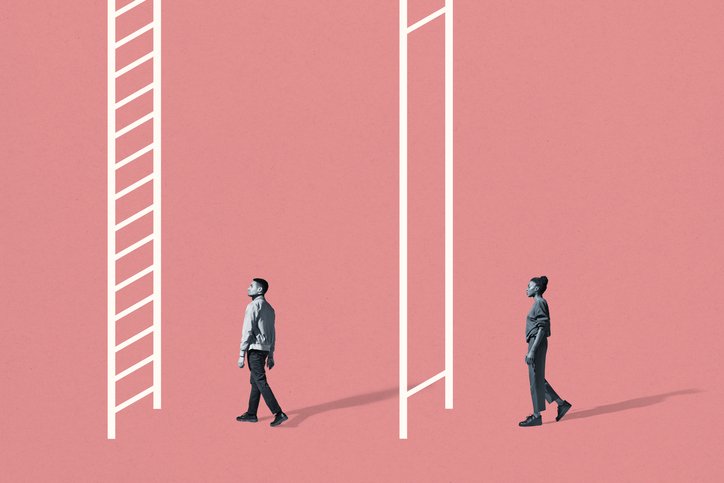
Last week, our team engaged in a spirited discussion about the risks of rhetoric that is “provocative for the sake of being provocative.” As we discussed, I recalled an article I was assigned to read and respond to in an undergraduate class: Hanna Rosin’s “The End of Men” published in The Atlantic. I might have burst out laughing if I weren’t so anxious about people’s rights being systematically stripped away.
Our team recently discussed rhetoric that is provocative for the sake of being provocative. I recalled Hanna Rosin’s article 'The End of Men' and might have laughed if I weren’t so anxious about people's rights being stripped away. Click To TweetRosin’s thesis in her 2010 piece, and 2012 book of the same title, can be summed up with her assertion that: “Man has been the dominant sex since, well, the dawn of mankind. But for the first time in human history, that is changing — and with shocking speed … the modern, postindustrial economy is simply more congenial to women than to men.” She claims, “Once you open your eyes to this possibility, the evidence is all around you.”
Despite some intriguing premises, Rosin’s claim is propped up by an abundance of questionable “evidence”: Hasty assessments of fleeting trends driven by the Great Recession. Bioessentialist rhetoric and gendered stereotypes coupled with weak criticism of feminist foundations. Oversimplified meritocratic narratives with racist overtones. Assertions that growth of low-paying service jobs dominated by women somehow equate to a fundamental power shift. Anecdotes of men required to attend “fathering classes” of dubious approach, in which the instructor writes seemingly random numbers on a whiteboard to supposedly represent salary gaps between men and women, bellowing, off-script: “Who’s the damn man now? That’s right. She’s the man.”
As the title suggests, Rosin’s piece is draped firmly in a “zero-sum” scarcity mentality — suggesting progress for one group necessitates loss for another — which didn’t sit well with me when I was assigned to read it in 2014, and which today I have the knowledge and language to reject with greater specificity.
Needless to say, lived experiences of women, and world events more broadly, have decidedly undermined Rosin’s thesis, which was ill-advised from the start.
Personally, I think of an unemployed friend who applied to be a window washer and was told to her face that she shouldn’t pursue the job because the all-male team wouldn’t be able to restrain themselves from harassing her. A 17-year-old neighbor who took a job as a grocery bagger, whose manager normalized sexual comments she routinely got from older male colleagues. I think of the terrifying “incel” subculture and the violence it has inspired. I think of statistics tracking rising levels of violence towards trans people and trans women in the U.S.
I think of Black women I know who have learned years into their employment that white male colleagues with associate degrees were making more than they were with master’s degrees. Colleagues who considered negotiating their salaries but backed down or experienced panic attacks when they encountered pushback. Those ignored and silenced even after defying the odds to make it to more senior positions.
I think of people denied promotions when they happened to be pregnant. Those forced to leave the workforce to care for or homeschool children during the ongoing COVID-19 pandemic among other disruptions — who are disproportionately lower-income Black and Latinx women.
Next, I think of how these trends have become all but codified into the future for the 33 million people whose access to reproductive rights became jeopardized with the overturning of Roe v. Wade — the logical result of a massively ill-equipped, vindictive, and misogynistic president elected as a product of kyriarchy deeply entwined with our country’s history and present. I think of potentially transformative childcare legislation originally included in the Build Back Better Act, but stalled by Republicans and Joe Manchin, who cited concerns that child tax credits would discourage parents from working.
I think of Hillary Clinton’s loss of the 2016 election despite obviously being the qualified candidate — because her every word, tone, and outfit was picked apart by the media, and because her opponent, bolstered by the director of the FBI, inspired unprecedented scrutiny of her use of a private email server. (Notably, at least seven of the subsequent president’s team members did essentially the same thing, and he himself is now faced with a national security scandal that pales in comparison to a prohibited-but-relatively-common practice among government employees.) The double standards and immense harm they have enabled are, to say the least, painful to contemplate.
I think of Elizabeth Warren’s candidacy in 2020, which quickly faded into a pipe dream behind that of two older men, one of whom entered the race late in the game inspired by a “sense of duty” and was elected as the oldest U.S. president to date. I think of Vice President Kamala Harris, heralded as a representative of several “firsts” — yet who has faced the same scrutiny as other women in top offices, and has been given relatively few opportunities compared to previous vice presidents. I think of what we miss when we uncritically celebrate such “firsts.”
I feel furious at the lack of true representation in U.S. government, which it would hardly be an exaggeration to classify as a white-patriarchal-gerontocracy as compared to the U.S. population. Every day, this reality harms those most impacted by injustices — and all of us.
I feel furious at the lack of true representation in U.S. government, which it would hardly be an exaggeration to classify as a white-patriarchal-gerontocracy, as compared to the U.S. population. Click To TweetUnderlying all of the painful realities listed above (which is far from exhaustive!) is an appalling and persistent culture of sexism and misogynoir.
Flashback to 2010 — Enter: Hanna Rosin’s declaration of The End of Men.
How many men, frustrated by their perceived lack of opportunity in a (genuinely frightening) economic landscape latched onto rhetoric like Rosin’s and continued to radicalize their beliefs in subsequent years based on the scarcity and fear it fostered? For me, 12 years later, The End of Men highlights all the more clearly the danger of dramatically and prematurely making bold declarations in service of clicks — without a deeper analysis of prevailing power dynamics.
12 years later, 'The End of Men' highlights all the more clearly the danger of dramatically and prematurely making bold declarations in service of clicks — without a deeper analysis of prevailing power dynamics. Click To TweetPerhaps most disturbingly lacking in Rosin’s analysis is intersectionality; one metric that decidedly does deserve unpacking is the number of mentions of the word “white” in The End of Men. Of six uses, two refer to “white picket fence,” one to “white collar jobs,” and two serve to collapse white and Black communities into “colorblind” generalizations of trends, which she asserts are driven by gender and class. There is not one mention of structural racism complicating her thesis. “Irresponsible” hardly begins to cover this oversight in the context of her bold claims and access to wide-reaching platforms.
Perhaps most disturbingly lacking in Rosin’s analysis is any mention of structural racism. 'Irresponsible' hardly begins to cover this oversight in the context of her bold claims and access to wide-reaching platforms. Click To TweetLast year, Rosin published what amounted to a quiet retraction of her work in a brief post on The Cut entitled almost flippantly, “The End of The End of Men.” “The optimism! The smugness! The tragic naïveté! I suppose even back then I understood, somewhere deep down, that this was a high-wire act,” she acknowledges. “American women had made it to half the workforce with negligible institutional support and no cultural upheaval. That kind of miracle is hard to sustain.” The fact that this was obvious to me as a 20-year-old undergraduate critiquing Rosin’s work in 2014 makes me feel … much less vindicated than angry.
Even in her post from last year, Rosin cites a notoriously whitewashed “70-cents-to-the-dollar” gender wage disparity, even as she acknowledges a (single) example of systemic barriers disproportionately impacting Black women. “There is real pathos and humanity behind these numbers,” she writes earlier in the post, failing to directly acknowledge the role that her own work played in dehumanizing them.
'There is real pathos and humanity behind these numbers,' she writes, failing to acknowledge the role that her own work played in dehumanizing them. Click To TweetIn spite of Rosin’s retraction, her 2012 book remains an “Editor’s Pick” in Best Nonfiction on Amazon, undoubtedly driving new and uncritical readers to engage with the harmful and irresponsible narratives it forwarded.
For those who crave a “provocative” bent in their analysis, I will always encourage undertaking this aim through a critical lens of power and equity, in service of true disruption that will last beyond a few trends and clicks. This approach to disruption, I wholeheartedly believe, is one we will be able to stand behind a decade — likely many decades — from today.
For those who crave a 'provocative' bent in their analysis, I will encourage undertaking this aim through a critical lens of power and equity, in service of true disruption that will last beyond a few trends and clicks. Click To Tweet

















